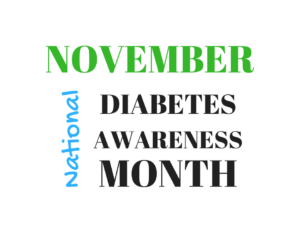Every November is National Diabetes (Awareness) Month


During this month, along with the Centers for Disease Control, the National Institutes of Health, the American Academy of Ophthalmology, the American Optometric Association, and many other organizations, we will be posting articles to help raise the awareness of diabetes. As board certified eye doctors, we will focus on how best to prevent vision loss from diabetic retinopathy.
It is estimated that about 10% of Americans will have diabetes by 2040. Unfortunately, most with the disease know little about diabetic retinopathy and how vision loss can be prevented. Presently, diabetes is the leading cause of blindness in the world.
By increasing awareness, we hope to better educate everyone so that diabetes is no longer a leading cause of blindness.
What is Diabetes?
We derive energy from the food we eat. Glucose, a sugar found in food, is used by our cells as a source of energy.
The hormone insulin is required to help our cells utilize the glucose (sugar) in our blood. Insulin helps keep our cells healthy and alive.
Patients with diabetes have difficulty maintaining and controlling normal blood sugar levels. In general, diabetes is characterized by having higher sugar levels in the blood compared to normal.
Insulin is normally produced by the pancreas. There are two types of diabetes:

- Type 1 Diabetes (T1D)
- Type 2 Diabetes (T2D)
Classification of the types of diabetes has changed over the years as our understanding of the disease has changed.
Patients with Type 1 Diabetes (T1D) have lost the ability for the pancreas to produce insulin. Patients with Type 1 Diabetes must take insulin on a daily basis to maintain sugar control.
Patients with Type 2 Diabetes (T2D) still have the ability to produce insulin, but the body does not use the insulin correctly or efficiently resulting in higher sugar levels.
Diabetic Diseases
Diabetes can affect the entire body. Diabetes often affects the eyes. Patients with diabetes are at greater risk for developing many diseases, including:
- Heart disease
- Stroke
- Peripheral neuropathy (nerve damage)
- Kidney failure
- Mouth and tooth disease
- Blindness
Diabetic retinopathy is the name of the eye disease caused by diabetes. Diabetes affects the light sensitive tissue inside the eye called the retina. The healthy retina captures light and sends electrical impulses to the brain to produce vision.
Diabetic retinopathy compromises the normal functioning of the retina and can cause blurry vision or even blindness. Most patients with diabetic retinopathy, however, do not even know they have the disease.
What Can You Do?
Help us spread awareness of diabetes by sharing, “Liking,” or “ReTweeting” our articles and posts. We will be posting several articles during National Diabetes Month to help your friends and family learn about diabetic eye disease and vision loss can be prevented.
For more information, please follow our website or our Facebook Page during November…National Diabetes Month. November 14 is World Diabetes Day.
We look forward to seeing you. If you would like to make an appointment or if you have questions about diabetes, please call us.
Gregory Scimeca, M.D.
Ophthalmologist and Medical Director
Burlington County Eye Physicians
Eye Professionals, LLC (Millville, NJ)
Eye Physicians and Surgeons of Bucks County (Langhorne, PA)
